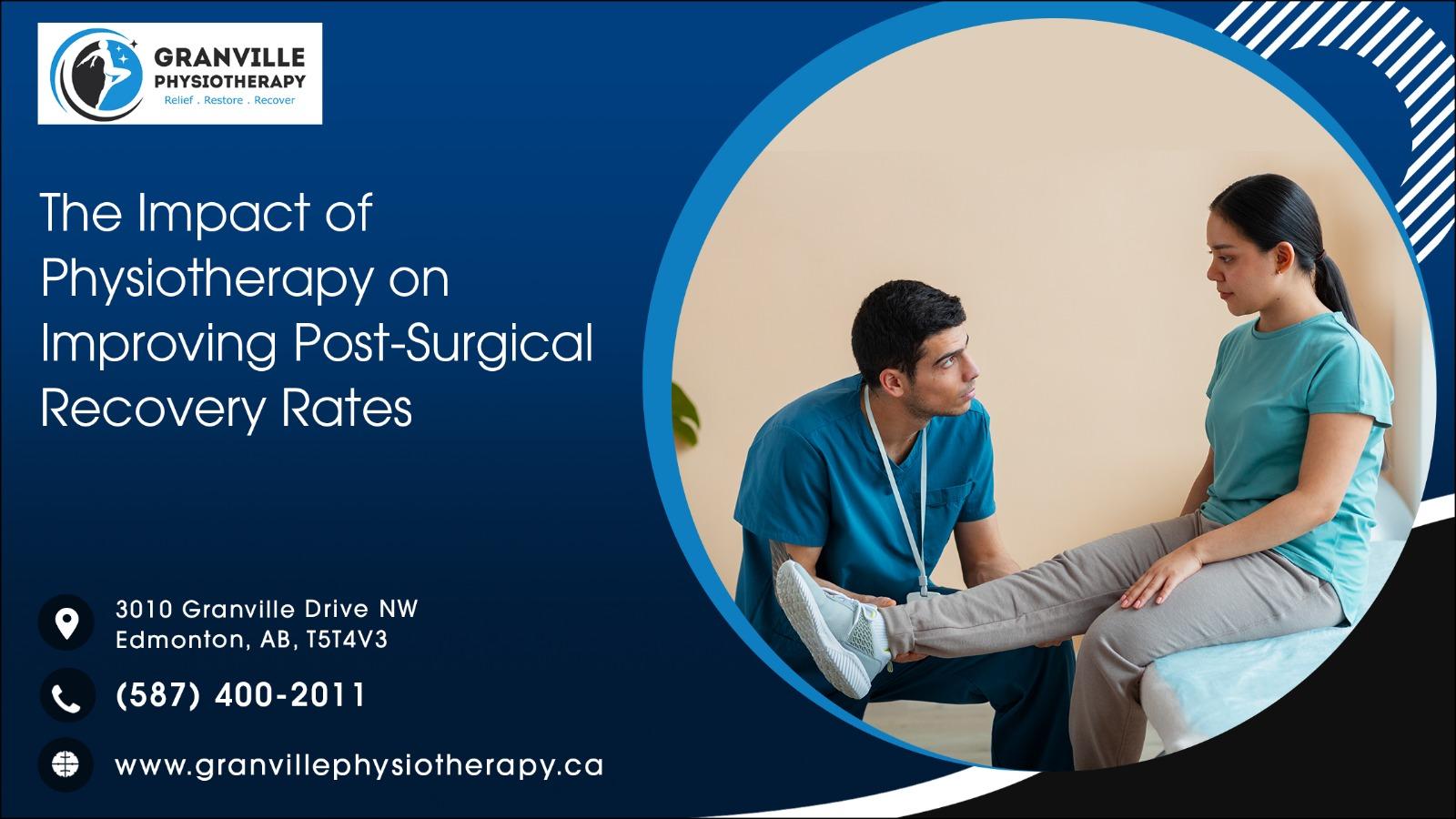Surgery, while often lifesaving or essential for the improvement of life quality, is invariably followed by a period of recovery. The role of physiotherapy, or physical therapy as it is also known, is pivotal in this phase, significantly impacting the rate and extent of a patient's return to optimal functioning. In Edmonton, facilities like Granville Physiotherapy are offering quality post-surgical rehabilitation services that set patients on the path to a swift and effective recovery.
Understanding Post-Surgical Recovery
Recovering from surgery is a delicate process requiring the healing of surgical wounds, rebuilding strength, and restoring function. The nature and duration of this recovery differ based on the surgery type, the patient's overall health, and any arising complications. The common goal, however, is to promote healing, minimize pain, and resume everyday activities promptly and safely.
Physiotherapy's Role in Recovery
Physiotherapy starts where surgery ends. It is an evidence-based approach that commences, in some cases, before the surgery (prehabilitation) and extends throughout the recovery period.
- Early Mobilization: A cornerstone of post-operative care through physiotherapy is early mobilization. Edmonton's physiotherapists prompt patients to begin gentle activities shortly after surgery to promote circulation, reduce the risk of blood clots, and improve respiratory function.
- Pain Management: Through modalities like cold and heat therapy, electrical stimulation, and therapeutic exercises, physiotherapists help manage and alleviate post-operative pain, offering an alternative to a heavy reliance on pain medication.
- Restoration of Function: Whether it's joint replacement or abdominal surgery, physiotherapy aims to restore strength and range of motion. Therapists guide patients through specific exercises that target affected areas, ensuring recovery is on track.
- Personalized Rehabilitation Programs: No two surgeries or patients are the same. Physical therapists in Edmonton tailor rehabilitation programs to meet individual needs, ensuring that each patient receives personalized care.
- Scar Tissue Management: Through manual therapy techniques and specific exercises, physiotherapists work to minimize the formation of restrictive scar tissue, which can lead to stiffness and limit mobility.
- Lymphatic Drainage: Physiotherapists employ techniques to stimulate lymphatic drainage, helping to reduce swelling and prevent fluid accumulation around the surgical site.
- Gait Training and Mobility: Post-surgery, especially after procedures involving the lower extremities or spine, patients may need to relearn walking. Physiotherapists provide gait training to promote correct movement patterns and ensure safe mobility.
- Joint Mobilization: To restore joint functionality, physiotherapists may perform joint mobilization techniques that help relieve stiffness and improve the range of motion.
- Neuromuscular Re-education: Following neurological surgeries or those that impact muscle function, physiotherapy aids in re-educating muscles and nerves, which is crucial for restoring voluntary control and coordination.
- Respiratory Physiotherapy: Particularly after thoracic or abdominal surgeries, respiratory physiotherapy can help clear the lungs of secretions and improve pulmonary function, which is crucial for preventing pneumonia and other respiratory complications.
- Re-education of Movement: Post-surgery, patients may need to learn new ways of moving to prevent strain on the surgical site. Physiotherapists teach adaptive techniques for performing daily tasks safely.
- Enhanced Recovery After Surgery (ERAS) Programs: Physiotherapists are integral to ERAS protocols, which are evidence-based care pathways designed to speed up recovery after surgery.
- Patient Education and Self-Management: Empowering patients with knowledge about their condition, post-surgical care, and self-management techniques to make sure they can maintain and improve their health outside of the clinical setting.
The Impact on Recovery Rates
The efficacy of physiotherapy in improving post-surgical recovery rates is well-documented. Patients who engage in a physical therapy Edmonton program often experience:
- Reduced Complications: Active engagement in physiotherapy can decrease the incidence of postoperative complications, such as exacerbation of infections or readmissions.
- Quicker Return to Activity: Structured physical therapy helps patients in resuming their daily activities and return to work more quickly than those who do not receive such care.
- Improved Long-Term Outcomes: With a focus on not only recovery but also education and prevention, physiotherapy can improve long-term outcomes, reducing the risk of future injuries or surgeries.
- Reduced Length of Hospital Stay: Patients who participate in regular physiotherapy often have shorter hospital stays, as they achieve postoperative milestones faster than those who do not receive such care.
- Long-term Mobility: With a focus on preserving and improving range of motion, physiotherapy can prevent the long-term loss of mobility that can occur after surgery due to inactivity or improper healing.
- Quality of Life: By easing pain, fostering improved bodily function, and decreasing recovery time, physiotherapy significantly impacts the patient's quality of life post-surgery.
- Cost-Effectiveness: Physiotherapy proves to be cost-efficient by reducing the rate of postoperative complications and the necessity for further medical procedures.
- Prevention of Secondary Complications: With educational resources and customized exercise regimens, physiotherapists guide patients in avoiding secondary complications such as falls, deep vein thrombosis, or chronic pain syndromes.
- Psychological Well-being: Moreover, physiotherapy enhances mental well-being by actively involving patients in their recovery journey, reducing feelings of helplessness, and promoting a healthier, more optimistic outlook.
Physiotherapy's Vital Role in Surgical Recovery
The impact of physiotherapy on post-surgical recovery cannot be overstated. It is an integral component of modern surgical care, one that paves the way for patients to reclaim their lives post-surgery. Centres like Granville Physiotherapy Edmonton are providing such critical services, improving recovery rates, and enhancing the quality of post-surgical care. For those on the road to recovery, physiotherapy is not just an option; it is a pathway to a quicker, safer, and more complete return to health and vitality.
Also read about:
Holistic Wellness The Healing Power of Comprehensive Physiotherapy
Pelvic Floor Physiotherapy Why Prioritize Wellness and When to Start
When is sports physiotherapy beneficial for flexibility training
















